Samsung Shows Off Premium Galaxy Chromebook at CES 2020: 13.3-inch Convertible With 4K AMOLED & More
by Anton Shilov on January 8, 2020 11:00 AM EST
While sales Chrome OS-powered laptops are continuing to grow, the vast majority of these PCs – and arguably the platform itself – have been positioned as entry-level solutions both in terms of price and in terms of hardware. As a result, premium Chromebooks have historically been a commercial footnote; Google and Acer (among others) have developed some models, but nothing has really made a lasting impact on the larger Chromebook market.
Samsung, however, thinks that they finally have a winning formula for a high-end Chromebook. With the new Samsung Galaxy Chromebook, announced this week at CES, Samsung is looking to up the ante on what to expect from a Chromebook both in terms of design and hardware, putting together a Chromebook that can rival premium Windows notebooks in everything from features to pricing.
The 13.3-unch Samsung Galaxy Chromebook starts things off with a touch-enabled AMOLED display which offers a 3840×2160 resolution, a peak brightness of 400 nits in HDR mode, and a very high contrast ratio (given peculiarities of the AMOLED technology). The Galaxy Chromebook is a convertible and therefore it can be used as a tablet as well. To that end, Samsung equipped the unit with two cameras as well as a built-in stylus.
Keeping with the size and weight needs of a convertible, the Galaxy Chromebook is also rather light. The laptop tops out at 1 kilogram thanks to its lightweight aluminum chassis, and is 9.9 mm thick at its largest point. Though you might be hard-pressed to even realize it's aluminum at first thanks to Samsung's color choices; the convertible comes in a rather intense Fiesta Red (pictured), or for a lighter touch, Mercury Gray.
Under the hood, the Galaxy Chromebook packs Intel’s 10th Generation Core processor with UHD Graphics, which can be accompanied by up to 16 GB LPDDR3 memory as well as an M.2 SSD with a capacity up to 1TB. While there are numerous Apple MacOS or Microsoft Windows-based PCs to feature a configuration like this, most of Chromebooks come with very limited amounts of DRAM and equally limited storage space. By contrast, Samsung’s Galaxy Chromebook is much closer to a modern, high-end 2-in-1 running Chrome OS.
In fact, Samsung has gone as far as designing the Chromebook to meet Intel's feature and design standards for Project Athena. So as well as meeting Athena's performance requirements, the Galaxy Chromebook has also been certified to meet the program’s user experience targets in terms of responsiveness, instant wake, and battery life. Which, with a 49.2 Wh battery, goes a long way in a 13.3-inch laptop.
Meanwhile, the wireless connectivity of the Galaxy Chromebook includes Wi-Fi 6 and Bluetooth, whereas wired connectivity consists of two USB Type-C ports, a UFS/microSD card reader, and a 3.5-mm audio jack for headsets. The system also has two 2W speakers, a microphone array, and a separate mono microphone.
| Samsung's Galaxy Chromebook Convertible | |||
| Galaxy Chromebook | |||
| Display | Diagonal | 13.3" with touch & pen | |
| Resolution | 3840×2160 | ||
| Brightness | 400 cd/m² | ||
| CPU | 10th Gen Core (Comet Lake) |
||
| Graphics | Intel UHD Graphics | ||
| RAM | up to 16 GB LPDDR3 | ||
| Storage | up to 1 TB SSD | ||
| Wi-Fi | Wi-Fi 6 | ||
| Bluetooth | Bluetooth | ||
| WWAN | - | ||
| GbE | - | ||
| USB | 2 × USB 3.1 Gen 1 Type-C | ||
| Cameras | Front | 1 MP | |
| On Keyboard Deck | 8 MP | ||
| Other I/O | UFS/microSD, TRRS connector for audio, speakers, microphones | ||
| Battery | 49.2 Wh Express Charge | ||
| Dimensions | Thickness | 9.9 mm | |
| Width | 302.6 mm | ||
| Depth | 203.2 mm | ||
| Weight | 1.04 kilograms | ||
| Battery Life | ? | ||
| Price (starting at) | $999 | ||
Samsung says that its Galaxy Chromebook will be available this quarter starting at $999.99 for an entry-level configuration, which is comparable to other Athena-class 13.3-inch notebooks, but certainly on the very high side for Chromebooks. And the top-of-the-line SKUs with faster processors and more storage will undoubtedly push that even higher.
Related Reading:
- HP Unveils Premium Chromebook: 3K Display, Intel Core M, 16 GB of RAM and USB-C
- HP Unveils Chromebooks for Enterprise: AMD and Intel
- Dell’s New Latitude 5300 2-in-1 and Latitude 5400: Chromebooks for Enterprise
- The ASUS Chromebook Flip C434: A Convertible Chromebook with Premium Features
- Google Launches Pixelbook: 12.3” LCD, Kaby Lake, 16 GB RAM, 512 GB SSD, Assistant, Stylus
Source: Samsung


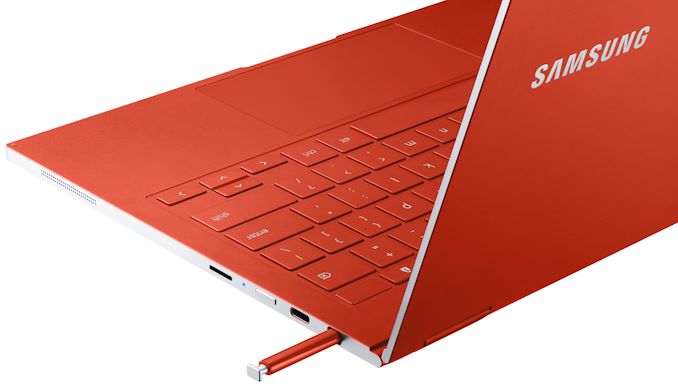
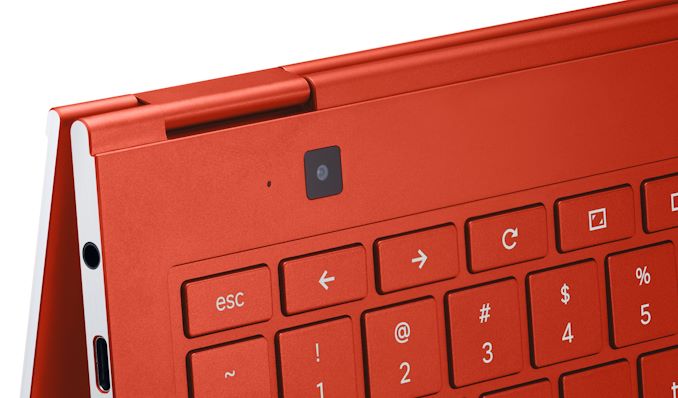
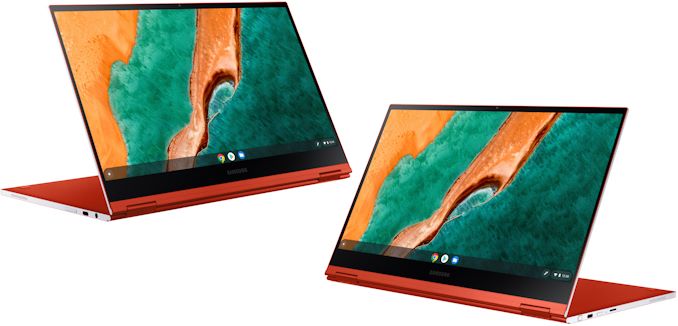
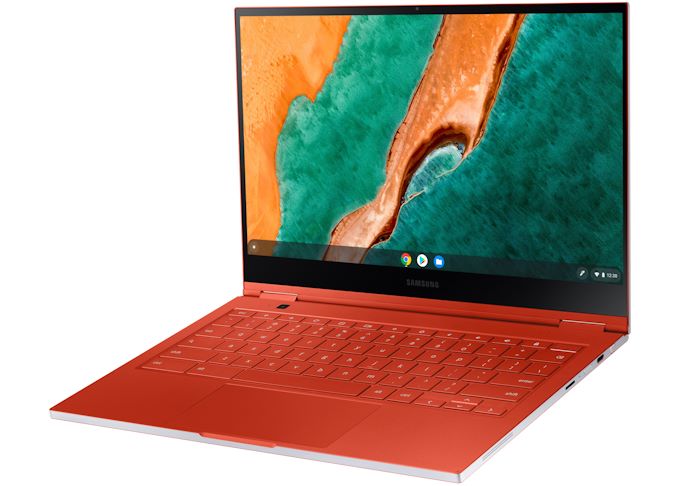
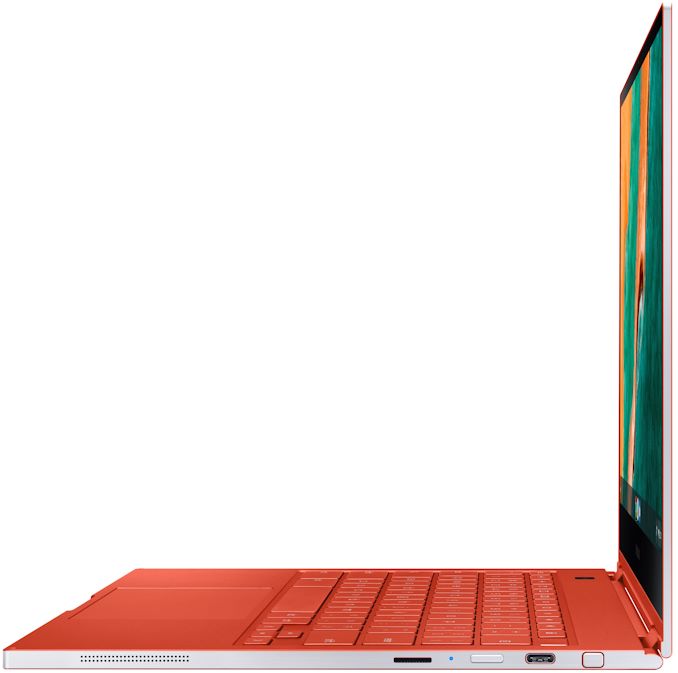








15 Comments
View All Comments
quiksilvr - Wednesday, January 8, 2020 - link
Why even bother with Comet Lake at this point? We all know its just 9th gen in disguise.adriaaaaan - Wednesday, January 8, 2020 - link
Oh, you're right my excitement for this just dropped 1000,%. I thought it was the new 10nm chip I hate intel sometimes, worst part is it's still gen 9 gfx tooAlistair - Wednesday, January 8, 2020 - link
Also AMD's new 6 core 15W laptop CPU runs at 2.1 Ghz vs. the Intel 1.1 Ghz. Double sustained performance advantage at 15W? Get that in a Chromebook then I'm interested haha.LuckyX2 - Thursday, January 9, 2020 - link
Even more than double with AMD's better IPC on Zen 2.PeachNCream - Wednesday, January 8, 2020 - link
1TB SSD on a Chromebook? That seems to go against the platform intent of keeping data stored seamlessly on Google's data mine...errr...I mean Google's cloud.iampivot - Wednesday, January 8, 2020 - link
You use the large SSD to run virtual machines / containers like linux and docker.PeachNCream - Wednesday, January 8, 2020 - link
Interesting use for a Chromebook. They have never struck me as potential host hardware for virtual machines or docker containers. i suppose this particular system has the RAM and storage capacity to do the job adequately for someone on the go. I run VirtualBox on a much lower spec laptop and its sufficient for lightweight testing chores so I can't see why the CPU, RAM, etc wouldn't be up to the task.adriaaaaan - Wednesday, January 8, 2020 - link
If you want to run classic Linux apps e.g. vscode the Chrome OS has a built in Linux container for running then securelyantivank - Sunday, January 12, 2020 - link
lol google sure have changed their tactics.This reminds me of the Nexus 4 back in 2012 with no sd card expansion , tiny 5 gb usable storage on the 8gb model but lots of free google cloud storage by . This was deliberately done to trick users into uploading everything to to cloud to help to fine tune the data mining algorithms...
NicolasQC - Wednesday, January 8, 2020 - link
I would really want to know if the display is a PenTile Amoled panel (which in totality, has 2 time less subpixel density), or a real RGB like every IPS, and in that case, it could be a realllly good deal! ♥️ (If everything else is really good)